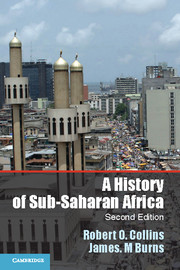Book contents
- Frontmatter
- Dedication
- Contents
- Acknowledgments
- Introduction
- Part I Foundations
- Part II Africa in World History
- 12 The arrival of Europeans in sub-Saharan Africa
- 13 Diseases and crops:old and new
- 14 Slavery in Africa
- 15 The Atlantic slave trade
- 16 The Asian slave trade
- Part III Imperial Africa
- Part IV Independent Africa
- Index
- References
14 - Slavery in Africa
Published online by Cambridge University Press: 05 June 2014
- Frontmatter
- Dedication
- Contents
- Acknowledgments
- Introduction
- Part I Foundations
- Part II Africa in World History
- 12 The arrival of Europeans in sub-Saharan Africa
- 13 Diseases and crops:old and new
- 14 Slavery in Africa
- 15 The Atlantic slave trade
- 16 The Asian slave trade
- Part III Imperial Africa
- Part IV Independent Africa
- Index
- References
Summary
Slavery is an institution with ancient roots. It is one of many unequal social relationships that humans have created over time, and it has existed in many forms. Some societies have treated slaves as family members, allowing them to marry, inherit property, and even earn their freedom. Others have dehumanized them, terrorizing them psychologically, exploiting them sexually, and treating them as beasts of burden, often to be worked to death. Although all human societies have social inequalities, slavery is common in those in which human labor is scarce and in demand. Ancient Rome, Eastern Europe in the Medieval era, and Africa for much of its history have been societies in which there was more work to be done than people to do it.
Slavery has deep roots in Western civilization. It was firmly established in the Mediterranean world by the Greek and Roman Empires, which acquired millions of slaves in wars and raids against the peoples living in the geographic arc that spanned Europe from the Caucasus in southern Russia to Spain. To the ancients, slavery was an institution that required no justification; even those guardians of ethical behavior such as the Greek philosopher Aristotle regarded it as an indispensable, normal, and acceptable feature of society. In the Roman Empire, many slaves were Slavs – from which the word slave is derived – as well as other Europeans, such as Germans, Saxons, Normans, Celts, and Gauls. The Romans enslaved some black Africans as well, although they did not appear to have associated slavery with skin color and there were numerous free Africans in their societies. Slaves were distinguished by custom and law, in which the slave was an object (res) – property with few rights.
- Type
- Chapter
- Information
- A History of Sub-Saharan Africa , pp. 201 - 211Publisher: Cambridge University PressPrint publication year: 2013



